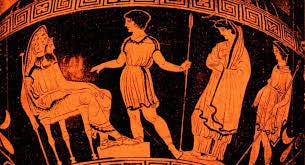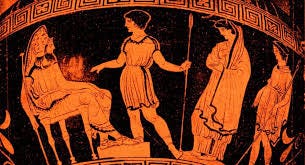I am starting an occasional series of Vignettes as part of the LitLetter series. Not to replace the letters on literature and poetry, rather to supplemennt them. A vignette could be defined as ‘a brief evocative description, account, or episode’, or in my interpretation ‘a story on a slice of life’. I plan to intersperse vignettes in between LitLetters.
I hope you enjoy the writing. Please send feedback.
ἀνδρες γαρ πολις, ού τειχη
These words are ancient Greek. The lad first encountered them on the front of a programme at his new Grammar school’s Founders Day ceremony in September 1965. He was 11 years old, a new boy of two weeks at a school of 1 200 boys and 70-80 teachers. The programme was handed to him as he entered Bradford Cathedral for the first time ever. He was small, nervous, new, lost, and oh so willing to learn.
The words were written below an emblem of his new school’s badge. He felt excitement that he could at least understand the words on the emblem as he had had a specific lesson already on that topic. The words were Hoc Age which are Latin for ‘Do It’. No procrastination, a resolve for action. A fitting motto for life.
His career at the Grammar school followed a classical curriculum. In the most unlikely of times and situations, in a grimy city trying to reinvent itself, in a school in the north of England in the 1960s and 1970s he created in his head unforgettable visions of glamour, beauty, tragedy, literary figures, alongside mathematics, algebra, rhetoric and logic. The pillars of a liberal arts education – these pillars have supported him all his life.
The men and women (the large proportion was male) who owned this responsibility to inculcate such treasures were common in one thing. A look, a level look, direct from their eyes, not to diminish or threaten but a look of invitation, an opportunity to a fledgling learner to say something meaningful, to articulate from his mind words that might express a (sort of) understanding, or an hypothesis, or ignorance and the need for a bit more time… If he took the opportunity at face value and responded in kind, then the world was his, and all teachings, and all literature, ever. That was the deal. So long as there was honesty, the men and women were patient. Their broad-vowelled speech could sometimes entice a condescending smile, yet no-one ever made the mistake of underestimating their elegant intelligence.
As his classical education developed he discovered the strange beauty of ancient Greece and Rome. His imagination thrived on the romance of the poetry, the tragedies, the human stories encapsulated in Homer’s The Iliad and The Odyssey, Sophocles’s play, Antigone, the Histories of Herodotus, to name a few.
His memory firms around Antigone. The defiance of a young girl in the face of a cruel and unnecessary authority not to honour a brother killed in war, this steely antipathy had always seemed to him the very stuff of real courage. He summoned up to himself some of Antigone’s bravery the evening he took a train to the neighbouring University city of Leeds to participate in a classical poetry reading competition. His reading was Antigone’s speech where she tells the ruler, Creon, his authority held no power for her, rather she was beholden to the ‘unwritten laws’ of her conscience. Far more powerful than the edict of a mere man. Something clicked as he delivered the ancient words in their original and raw power; and he won the competition. Is this how our characters, our strengths, are formed?
He loved the decoding practice of translating from and into these ancient languages. Soon he had branched also into the study of ancient history, via the literature of Xenophon, Livy, Pliny, Thucydides, and others. This last person, Thucydides, wrote what is generally considered one of the earliest scholarly works of history, The History of the Peloponnesian War. This was a terrible, multi-year war between two leagues, the one based around Spartan interests, opposed to the other based upon Athenian affairs.
The study of this war transfixed the lad. Such waste, such bravery, such stupidity, such intrigue. The realpolitik of the situation between Sparta, threatened by Athenian growth, and Athens in defence of a noble and everlasting culture seemed even to a schoolboy so modern, mirrored in then topical issues such as the Cold War, the petrol price shock of 1973, the Watergate scandal.
He was especially interested in the siegeworks, the engineering miracles used to break down walls of cities, presaging similar battles in the Middle Ages, some two thousand years later. The walls were necessary to keep out the enemy, but even before the wars they were a fact of life, to protect the inhabitants of cities from the lawlessness that prevailed in the unpoliced countryside.
‘ἀνδρες γαρ πολις, ού τειχη’.
In quotation marks as these words were put by Thucydides into the mouth of Pericles, the great Athenian general and political leader at that time. Pronounced ‘and-res gar polis, oo tay-care’, the phrase means: ‘The men are the city, not the walls’.
The lad understood immediately. Every Founders’ Day ceremony celebrated by his Grammar school reaffirmed the men who taught him, their level, direct look, their ownership of a great service to the common weal, their dedication to educating young men in the arts and behaviours of life.
It is not the structures confining the limits of the city that define it, it is the men and women living there who make a city great.





Love love love this! I thoroughly enjoyed reading this, Ian!
👍🙌❤️